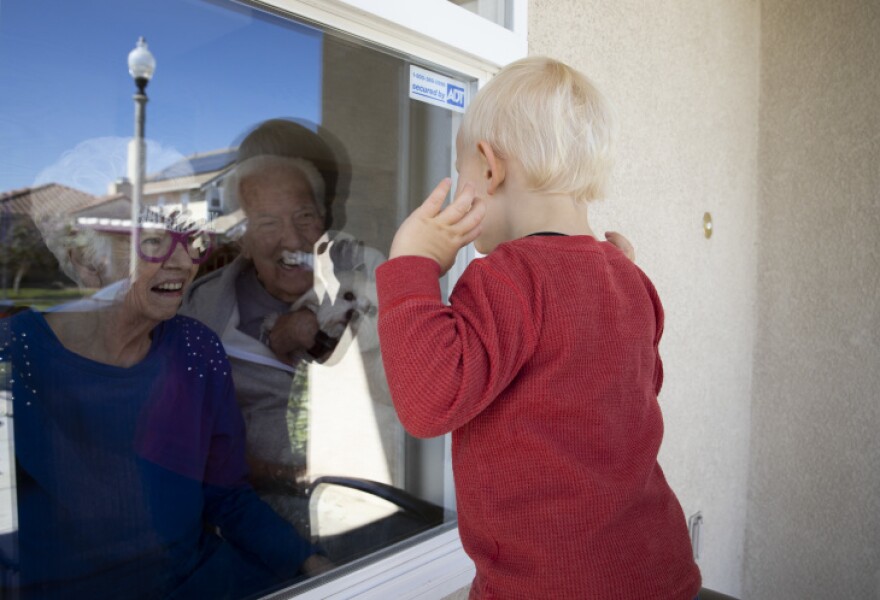This story is free to read because readers choose to support LAist. If you find value in independent local reporting, make a donation to power our newsroom today.
Some Much-Needed Advice On How To Talk To Your Aging Parents About The Coronavirus Pandemic

You may have heard advice from experts on how to talk to your kids about the coronavirus pandemic and how it's upended everyone's lives.
Now let's look at how to explain it to our aging parents. Dad and Mom may be accustomed to being strong figures in the family, but the virus doesn't know boundaries. Many seniors who have been very active physically and socially now have to stay home, and the usual visitors aren't allowed.
We talked to clinical psychologist Dr. Bonnie Olsen to get some guidance. She is a professor at Keck School of Medicine of USC.
Q: Let's start with the basic question: What is the best way to talk to our aging parents about this pandemic and the restrictions?
A: Well, I would say that the first thing to keep in mind is that you should be talking to your parents about it, and you should talk to them often. They're a particularly vulnerable population with this infection, and we want to make sure that they're well informed and following good guidelines for keeping themselves safe.
Q: Seniors who are active and independent, healthy, may still want to get out and about despite these stay-at-home orders. How do you convince them to heed the advice of the health experts?
A: The most important thing is to start off by asking questions. As we're talking to our aging parents, we want to understand what they understand about this situation, and then identify if there are areas where they have perhaps misinformation that you can clarify. I would be prepared to offer them good resources that you vetted and that you know are trustworthy, so that you can give them more accurate, up-to-date information.
Q: Seniors who suffer from short-term memory loss or Alzheimer's will likely not remember what they have to do to stay safe. So what are your suggestions for explaining stay-at-home orders, no close contact, no grandkid visits. What can serve as effective reminders?
A: Hopefully, there is someone who is in a caregiving role, perhaps another spouse, or it could be another family member there or a hired caregiver. I would make sure that that person was well aware of the need to keep the social distancing and is really skillful at distracting the older adult who has the memory loss from being focused on either the worries that might arise out of that or the desire to get out and do their normal activities.
It's pretty difficult to convince someone who has a memory loss. So more often than not, what we try to do is to create structure and activities in their day that make them feel more comfortable staying at home and having this very large change in their routine.
Q: I also want to talk to you, Dr. Olsen, about end-of-life decisions. As we've seen, the coronavirus can act swiftly, and it's wise, I would say, to know now what your parents' wishes might be. For example, if you do not know that they would decline extreme measures to keep them alive, how do you start this conversation?
A: I think the best approach for people to take as they want to have these conversations with their parents is to talk about the desire to follow the older adult's wishes when -- and if -- that time comes. The only way that one could do that is to really understand clearly what it is they want and what they think and feel about these important decisions.
Once you have an idea of what your parents would want, should that situation come up, then it's important to have that documented. There's a number of different forms and strategies, different mechanisms, to get that on paper and in the record so that it could be followed. And it truly doesn't matter which approach you take, just so long as it happens.
This interview also aired on 89.3 KPCC's Morning Edition, which Susanne Whatley hosts.
MORE ON CORONAVIRUS:
- Your No-Panic Guide To Coronavirus In LA So Far
- Where To Get Financial Assistance, Food And Other Help
- Tracking The Spread Of COVID-19
- Have A Question? We Will Answer It
DON'T MISS ANY L.A. CORONAVIRUS NEWS
Get our daily newsletter for the latest on COVID-19 and other top local headlines.
Terms of Use and Privacy Policy
Support our free, independent journalism today. Donate now.







